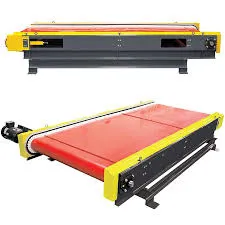

Dec . 09, 2024 21:56 Back to list
Understanding Industrial Metal Shredder Costs
In the metal recycling industry, industrial metal shredders play a crucial role in breaking down scrap metal into manageable sizes for further processing. These machines are essential for manufacturers, recycling centers, and even large construction firms that generate waste metal. However, one of the leading considerations for companies looking to invest in these heavy-duty machines is the cost associated with purchasing and operating them. This article will explore the various factors that contribute to the cost of industrial metal shredders and give potential buyers a comprehensive understanding of their investment.
Initial Purchase Price
The initial cost of industrial metal shredders can vary widely, typically ranging from $15,000 to over $1,000,000, depending on their size, capacity, and capabilities. Smaller, less powerful shredders designed for light materials may cost around $15,000 to $45,000, while larger, high-capacity models intended for heavy-duty operations can easily exceed $500,000. It is essential to assess your specific needs, including the type of metal you will be shredding and the volume of material processed. Not all organizations require advanced shredding capabilities; therefore, investing in equipment that exceeds your needs may not be financially prudent.
Types of Shredders
The type of industrial metal shredder also significantly influences its cost. There are various shredding technologies available, including single-shaft, double-shaft, and high-speed rotary shredders. Single-shaft shredders tend to be more affordable and are commonly used for materials such as aluminum or copper. In contrast, double-shaft shredders, which provide more versatility and can handle more robust materials, tend to be pricier. Ultimately, understanding the specific advantages of each type of shredder in relation to your operations will help guide your purchasing decision.
Operational Costs
Besides the initial investment, the operational costs associated with running an industrial metal shredder must be factored into your overall budget
. These ongoing expenses typically include electricity consumption, maintenance, repairs, and the costs associated with labor.
1. Electricity Heavy-duty shredders consume significant amounts of power. The larger and more powerful the machine, the more electricity it will require to operate efficiently. Understanding the energy specifications for your chosen model and estimating daily usage is crucial for budgetary purposes.
2. Maintenance Regular maintenance is vital for ensuring the longevity and optimal performance of the shredder. This includes routine inspections, blade replacement, and cleaning. Depending on usage frequency, maintenance costs can accumulate over time.
3. Repairs Even with the best maintenance practices, wear and tear can lead to occasional breakdowns. Budgeting for potential repairs is necessary, as unexpected downtime can result in lost revenue.
4. Labor Costs Operating a metal shredding facility often requires skilled personnel. The labor involved in feeding materials into the shredder, monitoring the process, and managing the output needs to be accounted for in your overall cost analysis.
Return on Investment (ROI)
When contemplating the cost of an industrial metal shredder, it is important to emphasize the potential return on investment. While the upfront and operational costs might seem steep, the long-term benefits of metal shredding can be substantial. Efficient shredding can lead to higher recovery rates of valuable metals, streamline recycling processes, and create cleaner materials that fetch better prices in the market. Additionally, shredded metal takes up less space, making logistics more manageable and potentially reducing transportation costs.
Conclusion
In conclusion, understanding the cost of industrial metal shredders involves evaluating not only the initial purchase price but also the various operational expenses associated with their use. Businesses must assess their specific needs and consider the type of shredder that best aligns with their goals. By doing so, companies can make informed purchasing decisions that promote operational efficiency and optimize returns on their investment in metal shredding technology. As the recycling industry continues to grow and evolve, the right industrial metal shredder can provide a robust solution for any metal processing operation.
Latest news
Troubleshooting Common Eddy Separator Problems
NewsJul.04,2025
The Role of Metal Recycling Plants in Circular Economy
NewsJul.04,2025
The Impact of Recycling Line Pickers on Waste Management Costs
NewsJul.04,2025
Safety Features Every Metal Shredder Should Have
NewsJul.04,2025
How Industrial Shredders Improve Waste Management Systems
NewsJul.04,2025
How Cable Granulators Contribute to Sustainable Recycling
NewsJul.04,2025